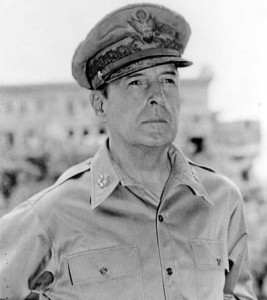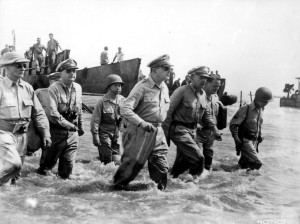In his retirement, my father collected biographies about World War II leaders. He said he wanted to understand what really happened in the war that dominated his adult life. My father was a navy man then, a middle grade officer. I don’t know if he found what he was looking for. I don’t know if any of us ever do.

“American Caesar”
Growing up in a household dominated by discussions of what Studs Terkel called The Good War, I was saturated in inaccurate memories of ideological bravery and honor. A historian by profession, I never developed much interest in Twentieth Century events. But when I closed out my father’s library, I kept several books. One of these is William Manchester’s American Caesar, a reasoned biography of Douglas MacArthur. General MacArthur was the most publicly personable and popular military leader during and after World War II. But despite his many gifts and talents, he had the fatal flaw of believing in his destiny to the extent of disbelieving any point of view but his own.

Public Domain, Wikimedia Commons
This photograph depicts General MacArthur’s public persona. A man of vision in his battered service cap, albeit with every possible bit of braid. The simplicity of a circle of five general’s stars. Gazing at something mere mortals could not see.
MacArthur’s life began on a frontier army post in 1880. Family tradition took him to West Point where he graduated in 1903. Though not exactly a team player, MacArthur became Army Chief of Staff in 1930 and Philippine Field Marshal in 1936. Then things became interesting.
Charged with defending the Philippines, MacArthur’s strategy failed in 1941. The general retreated to Australia, was placed in charge of that country’s defenses, and received the Congressional Medal of Honor. Such are the fortunes of war. MacArthur went on to direct strategically successful campaigns, culminating in his landing at Leyte on October 20, 1944. “I have returned,” he famously said.

Landing at Palo Beach, Leyte, Philippines, 1944
Public Domain. Wikimedia Commons
MacArthur presided over the Japanese surrender on board the USS Missouri. He was Supreme Commander of Allied Powers in Occupied Japan. When North Korea invaded South Korea in 1950, President Truman named MacArthur as United Nations Commander. MacArthur was seventy years old, at the height of his long military career. Then, the very character of American warfare changed.
MacArthur thought the purpose of war was to win with minimal casualties. But the Korean Conflict was not a war. It was the United Nations’ first police action. It was not about destroying an enemy, but restoring pre-war boundaries. MacArthur butted heads with his superiors, including President Truman, and lost his command in 1951.
Facts are facts, but interpretations vary. William Manchester (1922-2004) published American Caesar in 1978. I can’t help but think he wrote MacArthur’s biography for the same reason my father read it. Using the vehicle of one man’s life, Manchester explicated the past to explain the present. But 1978 was not 1945. The world was not America’s playing field.
Even General MacArthur’s view of war changed. Technology had destroyed all gallantry and intrigue. “When I entered the Army,” he said in 1955, “the target was one enemy casualty at the end of a rifle . . . Then came the machine gun, designed to kill by the dozen. After that – the heavy artillery, raining death by the hundreds. Then the aerial bomb, to strike by the thousands, followed by the atom explosion to reach the hundreds of thousands. Now, electronics . . . have raised the destructive potential to encompass millions.” Such innovation “destroyed the possibility of war being a medium of practical settlement of international differences.”*
And yet, we fight wars daily.
*Quoted by William Manchester in American Caesar, pp 693-4.
William Manchester. American Caesar: Douglas MacArthur 1880-1964. Boston: Little, Brown and Company. 1978. 709 pp, Notes, Bibliography, Index.

Sandra Wagner-Wright holds the doctoral degree in history and taught women’s and global history at the University of Hawai`i. Sandra travels for her research, most recently to Salem, Massachusetts, the setting of her new Salem Stories series. She also enjoys traveling for new experiences. Recent trips include Antarctica and a river cruise on the Rhine from Amsterdam to Basel.
Sandra particularly likes writing about strong women who make a difference. She lives in Hilo, Hawai`i with her family and writes a blog relating to history, travel, and the idiosyncrasies of life.


Thanks for the reminder on MacArthur. The quote at the end is chilling.
After leaving the army, MacArthur became an advocate for ending warfare. The cost was too great. Thanks for your comment, Barbara